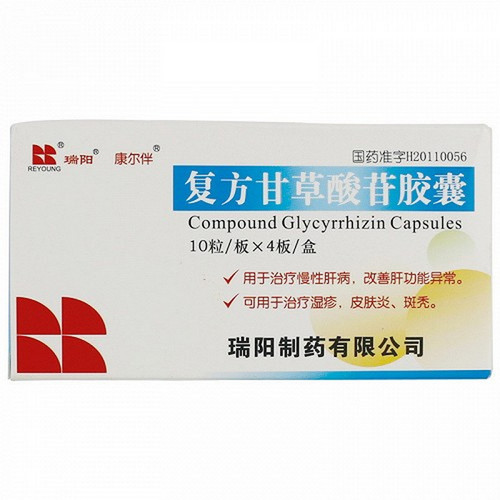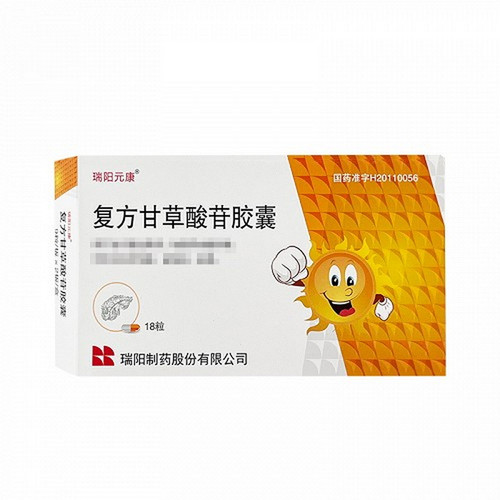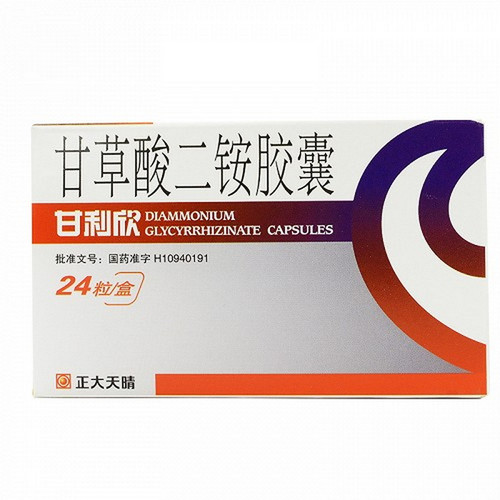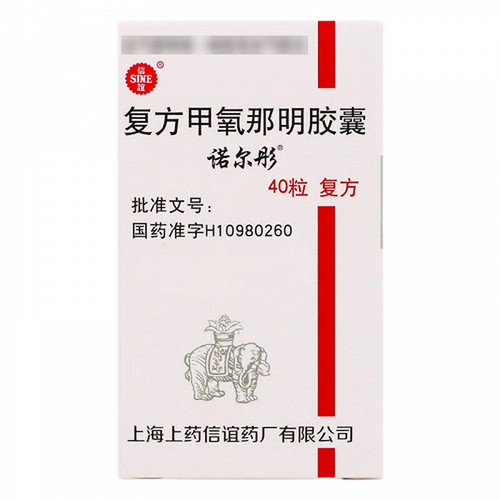Product Overview
[Drug Name]
Generic Name: Compound Glycyrrhizin Capsules
Trade Name: Poisson Compound Glycyrrhizin Capsules, 40 Capsules
[Main Ingredients]
This product is a compound preparation. Each capsule contains: glycyrrhizin 25mg, glycine 25mg, and DL-methionine 25mg.
[Properties]
This product is a pale yellow granule.
[Indications/Main Functions]
It is indicated for protecting liver cells, improving liver biochemical parameters, and preventing liver failure; combating liver fibrosis, inhibiting hepatocellular carcinogenesis, blocking hepatoviral replication, and exerting bidirectional immunomodulatory effects. It is used to treat various chronic liver diseases, abnormal liver function, eczema, dermatitis, urticaria, etc.
[Specifications]
40 capsules
[Dosage and Administration]
Adults: generally 2-3 capsules at a time; children: 1 capsule at a time, 3 times daily, orally after meals. The dosage may be increased or decreased based on age and symptoms.
[Adverse Reactions]
The actual frequency of adverse reactions associated with the use of this preparation has not been investigated. Significant adverse reactions: Pseudoaldosteronism (frequency unknown). Symptoms of pseudoaldosteronism may include hypokalemia, increased blood pressure, sodium and fluid retention, edema, decreased urine volume, and weight gain. Therefore, during medication use, carefully monitor serum potassium levels and discontinue medication if abnormalities are detected. Symptoms of rhabdomyolysis, such as weakness, muscle weakness, muscle pain, limb cramps, and paralysis, may also occur. If elevated CK (CPK) levels or blood or urine myoglobin are detected, discontinue the drug and administer appropriate treatment.
[Contraindications]
1. Patients with aldosteronism, myopathy, or hypokalemia (can aggravate hypokalemia and hypertension). 2. Patients with advanced cirrhosis who are prone to elevated blood ammonia levels (methionine metabolites in this preparation can inhibit urea synthesis, impairing ammonia processing).
[Drug Interactions]
Drug interactions may occur if used concurrently with other medications. Consult your physician or pharmacist for details.
[Precautions]
1. Use with caution. Use with caution in elderly patients (elderly patients have a high incidence of hypokalemia). 2. General precautions. Since this preparation contains glycyrrhizic acid glycoside, when used in combination with other licorice preparations, it can increase the glycyrrhizic acid glycoside content in the body, which can easily lead to pseudoaldosteronism. Caution should be exercised.
[Use in children]
Not yet clear.
[Use in elderly patients]
Not yet clear.
[Overdose]
Not yet clear.
[Pharmacology and toxicology]
Pharmacological effects: 1. Anti-inflammatory effect (1) Anti-allergic effect: Glycyrrhizic acid glycoside has anti-allergic effects such as inhibiting local allergic reactions (Arthus Phenomenon) and inhibiting Schwartzman phenomenon (Shwartzman Phenomenon). For corticosteroids, it enhances the hormone's stress response inhibitory effect and antagonizes the hormone's anti-granulation and thymic atrophy effects. It has no effect on the exudation of hormones. (2) Inhibitory effect on arachidonic acid metabolic enzymes Glycyrrhizic acid glycoside can directly bind to phospholipase A2, the initiator of the arachidonic acid metabolic pathway, and to lipoxygenase, which acts on arachidonic acid to produce inflammatory mediators, selectively inhibiting the phosphorylation of these enzymes and inhibiting their activation. 2. Immunomodulatory effect: Glycyrrhizic acid glycoside has the following immunomodulatory effects in in vitro tests: (1) Regulatory effect on T cell activation; (2) Induction of interferon-γ; (3) Activation of NK cells; (4) Promotion of extrathymic T lymphocyte differentiation. 3. Inhibitory effect on experimental hepatocyte damage In in vitro primary cultured rat hepatocyte cell line, glycyrrhizic acid glycoside has the effect of inhibiting hepatocyte damage caused by carbon tetrachloride. 4. Inhibiting viral proliferation and inactivating viruses: In experiments with MHV (murine hepatitis virus) infection in mice, glycyrrhizic acid administration prolonged their survival. In experiments with vaccinia virus in rabbits, it prevented the onset of pox. In vitro experiments have also observed inhibition of the proliferation of herpes viruses and other viruses, as well as viral inactivation. Glycine and methionine have been reported to inhibit the reduction in urine volume and sodium excretion caused by oral administration of glycyrrhizic acid to rats.






